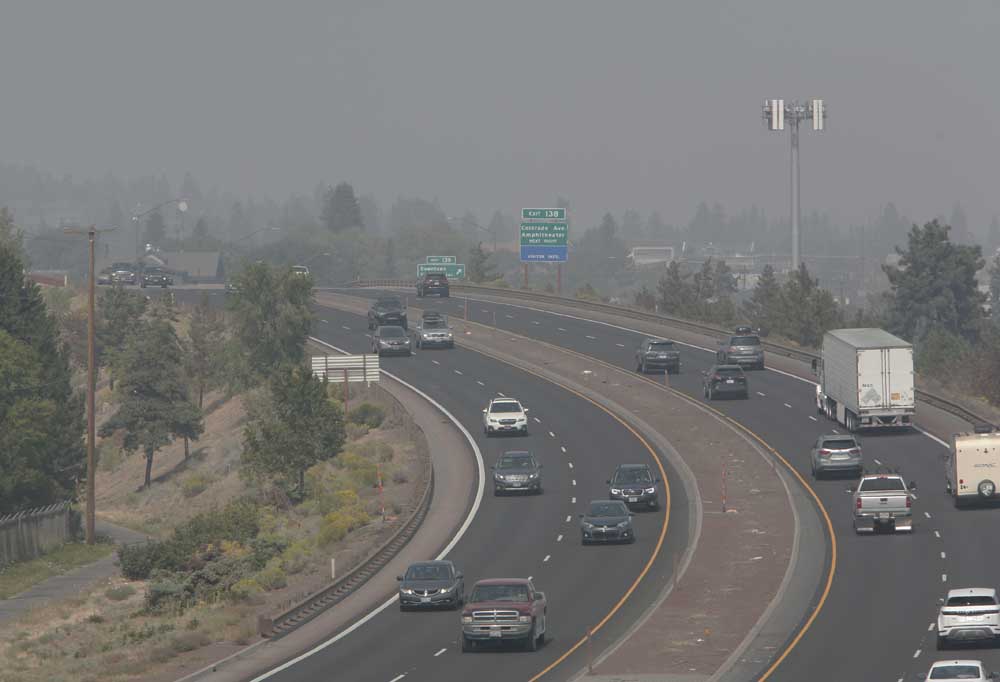Wildfire smoke an increasing problem in Central Oregon
Published 5:00 pm Friday, January 7, 2022

- Travelers are shrouded in smoke as they drive along U.S. Highway 97 through Bend in September 2021.
Smoke from wildfires returned to Bend in a big way in 2021, creating one of the longest smoke seasons in city history.
Last year, Bend had 18 days of air quality that fell under the category “unhealthy for sensitive groups” or worse, compared to 12 such days caused by wildfire in 2020, according to Laura Gleim, a spokesperson for the Oregon Department of Environmental Quality.
“The wildfire smoke lasted longer in Bend (in 2021) than any year on record, but the intensity of wildfire smoke wasn’t as bad … as last year,” said Gleim.
As for the intensity of the smoke, Gleim explained that in 2020 there were six days with average air pollution in the most extreme category (hazardous). In 2021, there was just one day in the hazardous category.
The poor air quality days were the result of wildfires burning mostly in other parts of Oregon and the West, as relatively few acres burned in Central Oregon last year.
In 2021, just 9,010 acres of land burned in the area monitored by the Central Oregon Interagency Dispatch Center, compared to the annual average of 55,903 acres burned in the area, according to Jean Nelson-Dean, spokesperson for the Deschutes National Forest.
The worst of the smoke appeared in late August and early September, mainly from the Middle Fork Complex fire, which burned in Lane County, west of Deschutes County. The Bull Complex fire in the Mount Hood National Forest was another source of smoke in Bend.
Summer smoke also crept up from the Bootleg Fire, which burned in Southern Oregon and became the second-largest wildfire in the 2021 wildfire season.
Wildfire smoke contains particulate matter 2.5 microns or less that can penetrate the lungs and enter the bloodstream, increasing the chance for heart and lung ailments if exposed at high levels for long periods of time, especially for sensitive groups.
According to the Environmental Protection Agency, individuals at greater risk of health effects from wildfire smoke include those with cardiovascular or respiratory disease, older adults, children, and pregnant women.
When particulate matter is at unhealthy levels, health authorities recommend that people stay indoors, a situation that affects daily routines and can also hurt the local economy, especially businesses that rely on tourists and other out-of-towners in Bend for concerts and events.
In September, Les Schwab Amphitheater canceled a concert that featured Death Cab For Cutie as the headlining act when smoke became too thick in Bend.
Not only did the venue lose money, but so did hotels, restaurants, bars and shops that benefit from the influx of concertgoers.
Dana Whitelaw, executive director of the High Desert Museum, said the museum is also impacted by smoke and “sees significant revenue loss” as residents and visitors tend to stay home on smoky days.
“It also impacts what programs we can run since it impacts our outdoor staffing model and even the raptors, believe it or not, get days off during poor air quality,” said Whitelaw.
The Labor Day fires of September 2020 that brought extreme smoke to Bend accounted for the main difference between 2021 and 2020. There was no cataclysmic event in 2021, but rather a series of lower impact fires that burned over a longer period of the year.
According to Gleim the 18 days of air quality at “unhealthy for sensitive groups” or worse made 2021 the smokiest year on record in terms of duration.
The second-worst year for the duration of smoke was 2017 with 15 days at unhealthy for sensitive groups or worse.
Gleim said this year’s smoke is part of a trend that is not new in Oregon.
“Most of the smoke we see in Oregon is from wildfires,” said Gleim. “That smoke has been increasing in intensity and duration over the past several decades.”
The increase stems from fire seasons that have become longer and hotter, a problem associated with climate change.
Some Central Oregonians are finding ways to navigate the situation.
After the Sisters Folk Festival was canceled twice due to smoke in recent years, organizers last year pushed the event back from September to October in order to avoid the smoke season.
Hotel operators are also getting better at helping their guests find things to do in Bend when the air quality deteriorates.
“Our team became savvy smoke guides,” said Samuel Johnson, general manager of The Oxford Hotel in Bend, when reflecting on poor air quality days last year.
He said his employees monitored the air quality and sent guests to parts of Central Oregon less affected by the smoke.
“We found travelers were flexible and able to change where they went hiking and biking,” said Johnson. “Obviously, this isn’t sustainable for long periods of time or when the entire area is blanketed, but this past year especially we were able to shuffle people around based on air pocket quality.”






